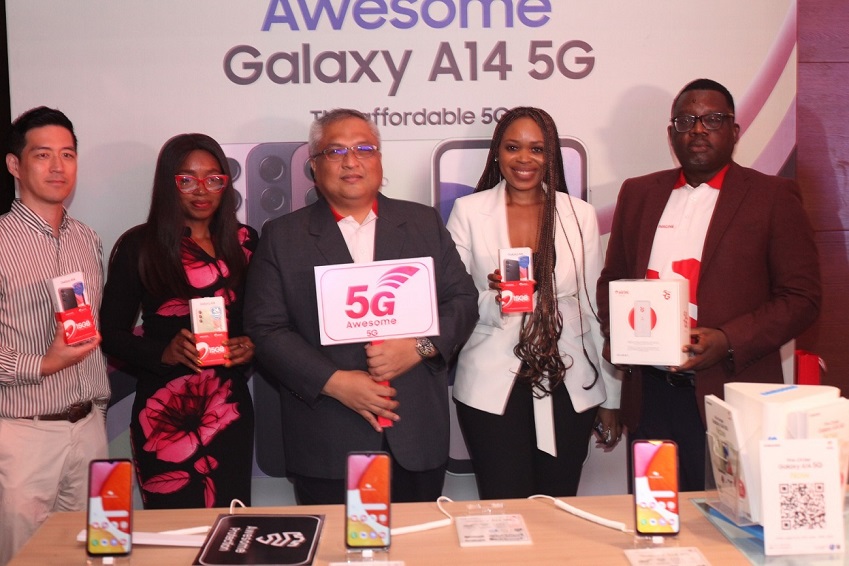Telecom
Samsung Launches Galaxy A14 5G in Partnership with the Airtel 5G Launch

Samsung, Nigeria’s consumer electronics brand, has announced the launch of Galaxy A14 5G.
This latest addition to the popular Galaxy A series is aimed at offering a complete package of the latest Galaxy innovations at an affordable price, making awesome technology accessible to everyone, especially to Airtel Nigeria customers.

L-r: Nathan lee Business Manager, Samsung Nigeria; Joy Tim-Ayoola Head of MX division, Samsung Nigeria; Carl Cruz, Country Manager, Airtel Nigeria; Chika Nnadozie, Head of Marketing, Samsung Nigeria and Femi Oshinlaja, Chief Commercial Officer, Airtel Nigeria, during Airtel-Samsung partnership for Galaxy A14 5G device
The device was unveiled on Monday, June 19 2023 in exclusive partnership with Airtel Nigeria, during the latter’s 5G service launch in Lagos.
Charles Lee, the Managing Director, Samsung Nigeria, said that Samsung has been driving 5G adoption globally with its widest portfolio of 5G devices and it is ready to replicate the feat in Nigeria.
He said that with the launch of Galaxy A14 5G, Samsung will now have the widest distribution of 5G devices in the country.
According to the Samsung MD, the Galaxy A14 5G showcases Samsung’s premium design and this comes with industry-leading features like 16GB RAM with RAM Plus and 5000mAh battery.
“Starting at a net effective price of just N122,000, the device will be instrumental in driving Airtel’s mission of ‘re-imaging with 5G’ and accessible to everyone,” said Lee.
Earlier in this speech, Carl Cruz, the Chief Executive Officer of Airtel Nigeria, thanked Samsung for partnering with the network to democratize 5G accessibility and affordability in the country.
The Airtel CEO said that 5G is not meant to be out of reach to the masses.
“We are here to democratize 5G. Our research entails customers with a 10x faster speed network with low latency and no lag; to connect more users, 8K streaming, available to iOS and Andriod devices. So, we are offering the most affordable 5G router with N30,000 offer, and partnering with Samsung A14 5G model to deliver the most affordable 5G handset in the country”, he said.
Also speaking, Chika Nnadozie, Head Marketing PR, Samsung Nigeria, said that Galaxy A14 5G showcases Galaxy’s signature design philosophy for a premium feel in mid-segment products. The laser pattern back cover enhances the stunning design and the flat linear camera housing creates a seamless unibody silhouette.
“Galaxy A14 5G will come in three new colours – Dark Red, Light Green, and Black. Nigerians can start to preorder the device now and be assured of massive gifts”, Nnadozie said.
Solomon Osibeluwo, Master Trainer MX, Samsung Nigeria, said Galaxy A14 5G comes with 6.6” HD+ display with 90Hz refresh rate for real smooth scrolling. The edge-to-edge Infinity-V display offers a large screen experience to consumers to explore and create content.
On the battery life, he said, Galaxy A14 5G comes with a massive 5000mAh battery, with up to two days of power. The sleeping app management feature puts apps to sleep and prevents them from running in the background so you can focus on the apps you use most often.
“For the camera, Galaxy A14 5G features 50MP triple-lens rear camera set-up with depth and macro lens for high-quality shots and a 13MP selfie camera. The high-resolution camera allows users to capture the finest details and ensure social media-ready pictures every time”.
“Galaxy A14 5G’s Private Share feature allows users to securely share photos and videos using blockchain technology with other Galaxy users. It comes with four years of security updates and two OS upgrades, making it a future-ready smartphone.
Galaxy A14 5G is powered by Exynos 1330 Octa-core processor for smooth performance and enhanced multitasking and protected by Knox Security.
Telecom
FG Expands 3MTT Programme Across the Country

Dr Bosun Tijani, Nigeria’s minister of communications, innovation, and digital economy, has revealed that the federal government’s 3 Million Technical Talent (3MTT) programme has trained over 135,000 citizens as it moves from pilot to national level.

Tijani announced this in an update on the program’s success, stating that the beneficiaries were trained in three batches.
He also stated that the initiative’s community-based learning tools had provided over 300,000 extra learners with access to digital skills training across the country.
According to the minister, the program has also enabled the creation of about 15,000 job, entrepreneurship, and career development in Nigeria’s developing digital economy.
He further revealed that more than 1.8 million Nigerians are currently in the 3MTT pipeline, as the government works toward its target of equipping three million citizens with in-demand digital skills aligned with local and global labour market needs.
As the programme enters its scale-up phase, Tijani said the government’s focus will shift toward deepening impact rather than just expanding numbers.
Key priorities, he explained, include strengthening the 3MTT alumni community, widening access to economic opportunities and ensuring that skills acquired through the programme translate into measurable outcomes such as jobs, business creation and innovation.
To support this phase, the federal government has introduced the #3MTTImpactChallenge, an initiative aimed at assessing the programme’s real-world impact
Through the challenge, fellows and partners are invited to share personal stories on how 3MTT has shaped their professional journeys as part of a National Impact Reflection exercise.
Participants are expected to share their experiences across social media platforms, with selected winners set to receive prizes including laptops, e-tablets, data bundles and other incentives.
Telecom
MTN Foundation Trains 2,000+ Young Nigerians in ICT for SME Growth

MTN Foundation has kicked off the seventh phase of its ICT business skills training programme, targeting more than 2,000 entrepreneurs, mostly from Nigeria’s small and medium-scale enterprises (SMEs), in support of the Federal Government’s National Digital Economy and SME Development agenda.

MTN Foundation
The virtual training’s first week ran from Monday, January 5, to Friday, January 9, 2026. It equips small business owners and aspiring entrepreneurs with simple digital tools to shift from paper-based operations to efficient, productivity-boosting systems.
Business analyst Babajide Jolaolu-Kehinde, moderated by Temiloluwa Oyekanmi, programme and partnerships lead, introduced the SWOT framework—Strengths, Weaknesses, Opportunities, and Threats—to guide participants in assessing and improving their businesses.
Jolaolu-Kehinde stressed digital record-keeping, online payments, and customer data tracking for measurable growth, aligning with government efforts to formalise SMEs. “Hope is good, but action and systems make growth happen,” he said.
Trainers showcased real-world examples: traders using handwritten ledgers expanded reach via WhatsApp Business, online marketplaces, and spreadsheets; others grew by accepting mobile transfers over cash and digital orders to tap distant markets.
Manual operations limit sales visibility and customer insights, experts noted, while digital tools deliver real-time data, cut errors, and unlock broader markets.
Participants must adopt at least one digital tool post-onboarding, with organisers promising follow-up workshops and mentorship. The four-week programme aims to bolster SME growth and Nigeria’s economic goals.
Telecom
Spacecoin Secures Licenses to Roll Out Satellite Connectivity in Nigeria, Kenya

Spacecoin, US-based, has announced the signing of recent agreements with local authorities and operators to launch satellite connectivity pilot projects in Africa.

The initiatives, focused on Kenya and Nigeria, aim to serve areas where terrestrial networks remain limited or unavailable.
n Kenya, Spacecoin has obtained a transmission license from the Communications Authority, allowing it to test satellite-based solutions for connectivity and Internet of Things (IoT) monitoring, particularly in rural and peri-urban areas with limited internet access.
According to the Kenyan regulator, internet penetration remains below 50% of the population, despite mobile penetration exceeding 130%.
In parallel, the company is continuing operations in Nigeria under an existing license issued by the Nigerian Communications Commission (NCC).
This authorization supports initiatives aimed at delivering affordable broadband connectivity to isolated and underserved communities.
Spacecoin’s approach is based on a decentralized satellite network using nanosatellites in low Earth orbit (LEO).
Combined with blockchain-based protocols, this architecture is intended to offer more flexible and cost-effective connectivity services than traditional networks, while also enabling the integration of IoT solutions for a range of uses, from smart agriculture to infrastructure monitoring.
These projects are part of a broader strategy to help narrow Africa’s digital divide, where a significant share of the population still lacks access to reliable internet services.
Satellite technology is increasingly viewed as a complement to terrestrial infrastructure, particularly in hard-to-reach areas where deployment costs and geographic constraints remain high.
Beyond Africa, Spacecoin is also running pilot projects in Asia, working with local partners to test the viability of its model across different regulatory and geographic environments.
According to the company’s management, growing interest from regulators reflects a shift toward solutions capable of reaching populations that have long been excluded from internet access.

 General News2 days ago
General News2 days agoCybersecurity Firm Detects a Wave of Crypto Phishing Following BlockFi Bankruptcy

 News2 days ago
News2 days agoIMF Upgrades Nigeria’s 2026 Growth Projection to 4.4%

 Telecom2 days ago
Telecom2 days agoNCC Unveils Spectrum Roadmap to Power Nigeria’s $1tr Digital Economy

 Telecom2 days ago
Telecom2 days agoNCC Gives Amazon’s Kuiper, BeetleSat Nod to Provide Satellite Broadband Services in Nigeria

 General News2 days ago
General News2 days agoFG Rejects Northern Elders’ Gold Refinery Siting Claim

 News2 days ago
News2 days agoNew Horizons Invests N50m to Empower Almajiris with Skills

 Telecom1 day ago
Telecom1 day agoSpacecoin Secures Licenses to Roll Out Satellite Connectivity in Nigeria, Kenya

 E-Financial2 days ago
E-Financial2 days agoKongaPay K-Save Users Save over N3.2Bn

























